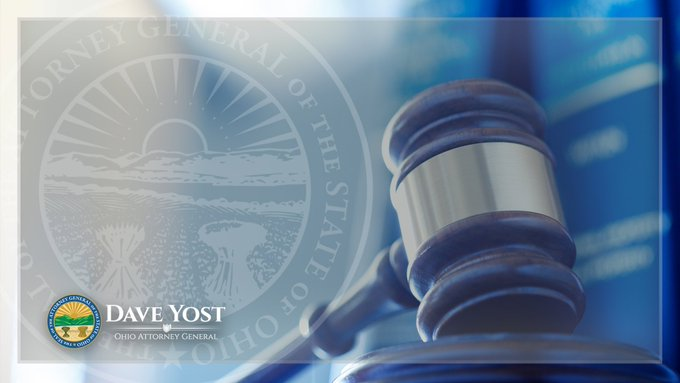
by Wayne Ohio | Dec 1, 2021 | Blog
COLUMBUS, OH, Nov. 30, 2021 — Ohio Attorney General Dave Yost issued the following statement regarding today’s ruling by the U.S. District Court of Eastern Kentucky enjoining the federal vaccine mandate for federal contractors:
“This is not about vaccines, it’s about the mandates,” Yost said. “The judge’s opinion clearly states that and it has been our position all along that the president cannot impose these mandates on the people.”
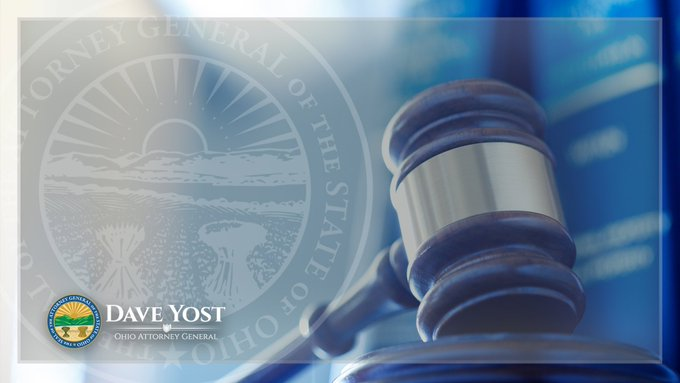
by Wayne Ohio | Nov 22, 2021 | Blog
COLUMBUS, OH, Nov. 22, 2021 — With the holiday shopping season upon us, Ohio Attorney General Dave Yost is warning consumers that illegal robocalls are trying to ruin Christmas by posing as a legitimate business such as Amazon, Apple, or PayPal to steal your money.
These scammers call out of the blue and suggest – under the guise of wanting to help remedy the situation – that a large purchase has been charged to your credit card.
“Legitimate companies don’t do business this way, so just hang up,” Yost said. “These impostors want to get you on the line and cause panic so you cough up personal information. My hope is that you will answer by ending the call.”
According to the Federal Trade Commission (FTC), various Amazon impersonation scams – many involving claims that a consumer has ordered an expensive product or service – are filling phone lines throughout the country.
The “representative” then persuades the consumer to give him or her remote access to the consumer’s device so the “representative” can issue a “refund.” Instead, the scammer gains access to the consumer’s personal identifying information.
In a variation of the scam, the fraudster persuades the consumer to buy gift cards as a way of “stopping” the unauthorized purchase.
On Amazon’s website, company guidelines make clear that Amazon would never call a customer to seek personal information or discuss a refund that the customer isn’t already expecting.
The Ohio Attorney General’s Office offers these tips to help consumers deal with business impostor scams:
- Hang up if you receive a cold call from someone claiming that you have purchased an item from Amazon or another popular online retailer. Do not call back the number on your caller ID or the phone number mentioned in the message. Instead, if you are concerned about the supposed purchase, contact the retailer using its legitimate phone number or email address. Customer service contact information can typically be found on the company’s website.
- Carefully examine the details of your online account purchases and credit card bills for any unauthorized charges. If you see an unauthorized charge, report it immediately to your credit card company.
- Never allow a stranger to remotely access your smartphone, tablet, or computer. If the caller claims to need remote access to process a refund, it’s a scam.
- Be highly suspicious of requests from a stranger to buy gift cards as payment for any product or service as part of a “refund” process, or to allegedly help stop fraud from a third party. Know that once you disclose a gift card’s PIN to someone, that person will be able to access the money on the card.
- To report a scam, contact the legitimate retailer through the contact information on its website and the Ohio Attorney General’s Help Center.
- If you’ve fallen victim to a business impostor scam by disclosing personally-identifying information, download the Ohio Attorney General’s ID Theft Basics publication and visit www.identitytheft.gov for help on how to proceed.
Consumers who suspect an unfair or deceptive sales practice should contact the Ohio Attorney General’s Office at www.OhioProtects.org or 800-282-0515.
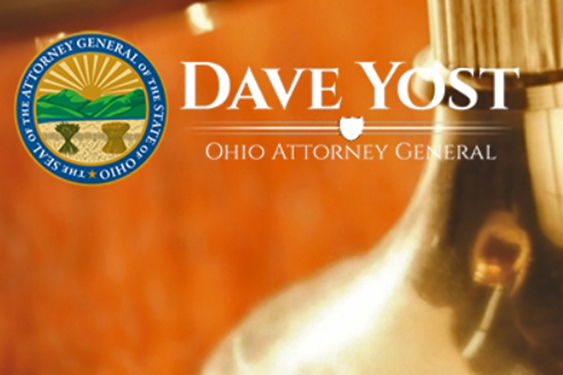
by Wayne Ohio | Oct 4, 2021 | Blog
COLUMBUS, Ohio, Oct. 4, 2021 — Ohio Attorney General Dave Yost today announced that 161 people were arrested and 51 potential human trafficking victims were helped in a statewide operation for which nearly 100 federal, state, and local law enforcement agencies partnered with non-governmental and nonprofit organizations.
Operation Ohio Knows, coordinated through AG Yost’s Ohio Organized Crime Investigations Commission (OOCIC), was a collaborative effort that took place from Sept. 24 to Oct. 1 to address issues that fuel sex trafficking in Ohio.
“People who traffic other humans are doing it for a really simple reason — money. And if there’s no demand then there will be no market,” Yost said Monday morning during a press conference at the Statehouse, where he was joined by leaders of law enforcement agencies and social service organizations. “Reducing the demand means we reduce the number of people who are victimized by human trafficking.
“We will not rest until no one in Ohio buys or sells human beings.”
The operation included the arrest of 161 individuals seeking to buy sex – three of who sought to buy sex from minors. During the course of the operation, law enforcement officers also arrested individuals who possessed drugs and/or firearms. Most were charged with engaging in prostitution, a first-degree misdemeanor. A change in state law passed in the spring requires those convicted to undergo human trafficking education, a provision promoted by Attorney General Yost to decrease the demand for prostitution.
Among those arrested were a teacher, a professor, a firefighter, a pilot, municipal employees, and a city councilman.
Fifty individuals offering to sell sex – men and women – were arrested. Law enforcement officers interviewed 51 potential human trafficking victims, who were provided services from health care and social services organizations.
A simultaneous operation carried out by the U.S. Marshals Service recovered 10 missing children.
Also participating in the press conference with the attorney general was Mandie Knight, a human trafficking survivor, who spoke about the role law enforcement played on her road to recovery.
“When I was being trafficked, I knew that law enforcement was somewhere I could turn to when I needed a safe way out, and that’s what happened,” said Knight, now resource manager for Freedom a la Cart and a wife, mother, and student in forensic criminology. “Had I not been arrested, had I not gone to jail, and had I not suffered some consequences for the decisions I was making, I wouldn’t be here today and I wouldn’t be as successful in life.”
Operation Ohio Knows is the latest anti-human trafficking operation under Attorney General Yost, whose office hosts an annual human trafficking summit and provides coordination, education, and outreach on the subject.
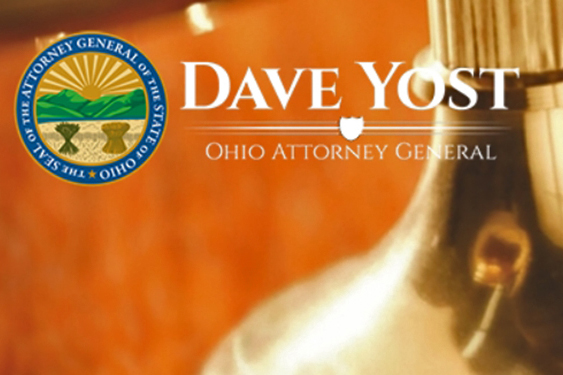
by Wayne Ohio | Jan 14, 2021 | Blog
COLUMBUS, OH, Jan. 14, 2021 — Ohio Attorney General Dave Yost has agreed to a multistate settlement with an organization that claimed to help wounded veterans of wars in Iraq and Afghanistan, but instead lined the pockets of the family behind the charity.
Healing Heroes, based in Florida, and its founders, Stacey and Allan Spiegel and their son Neal Spiegel, agreed to settle with 11 states where they solicited donations with bogus promises and misleading fundraisers.
“Ohioans always answer the call when our veterans need help and thought they were doing so here,” Yost said. “But this wasn’t a charity. It was disgraceful sham and we shut it down.”
Hero Giveaways, LLC, the business behind the charity formed by the Spiegel family became the subject of a multistate investigation into its use of deceptive charitable solicitations including misleading sweepstakes mailers and telemarketing campaign. The investigation by Yost’s Charitable Law Section revealed that Ohio donors contributed an estimated $525,544 between 2015-2017 as a result of deceptive sweepstakes mailers and telephone solicitations.
The organization promised to use donations to help wounded veterans of the wars in Iraq and Afghanistan receive medical treatments that the Department of Veterans Affairs did not readily provide. The charity also falsely claimed on social media in 2016 and 2017 to dedicate 100% of proceeds to wounded veterans. The investigation revealed that very little of the charitable contributions received by the Healing Heroes Network, Inc. were used to further that charitable mission.
Instead, donations were used to pay professional fundraisers, on-line advertising fees, the salaries of Stacey Spiegel and her son, Neal Spiegel, and to purchase t-shirts from another family’s member’s t-shirt business. The settlement announced today requires Healing Heroes Network, Inc. and Hero Giveaways, LLC to permanently cease all charitable solicitations, and the Spiegel family has agreed to pay $95,000.00 in monetary damages.
The money will go to a veterans’ charity whose mission matches the representations made by Healing Heroes Network, Inc. when they were soliciting donations from the public.
The Spiegels are also subject to a five-year ban from overseeing, managing, or soliciting charitable contributions for any nonprofit organization.
Ohio, along with Florida, Oregon, Illinois, Maryland, Minnesota, Missouri, New Mexico, California, Virginia and Washington are part of the settlement agreement announced this week.
This legal action is part of Operation Donate With Honor, a nationwide consumer protection law enforcement program to combat veterans’ fundraising fraud through education and enforcement. Operation Donate with Honor was coordinated in 2018 by the Federal Trade Commission and the National Association of State Charities Officials. The program targets fraudulent charities and groups that claimed to be helping veterans, but instead enrich the charities’ founders and professional fundraisers.
When donating, please consider the following tips to help ensure your money goes to the charitable purpose you intend.
When you receive a request to donate money, ask questions.
- Ask for the charity’s name and web address.
- Where is its physical location, phone number, and types of programs run by the charity?
- How much of the donated money supports the programs you want to support?
- Avoid paying with cash, gift cards, or wire transfers. Payment by these methods is difficult to track and therefore, difficult to recover.
- Consider donating by using a credit card, which tends to be more secure and trackable.
- Restrict your giving to organizations that you have personal knowledge of the programs provided or to develop a giving plan that defines in advance what groups you want to support during the year
If the charity is unwilling to answer your questions, that is a red flag. Attorney General Yost also has a searchable database of registered charities in the state, as well as resources to file a complaint.
Additional research of charities can be found at charitywatch.org and give.org.
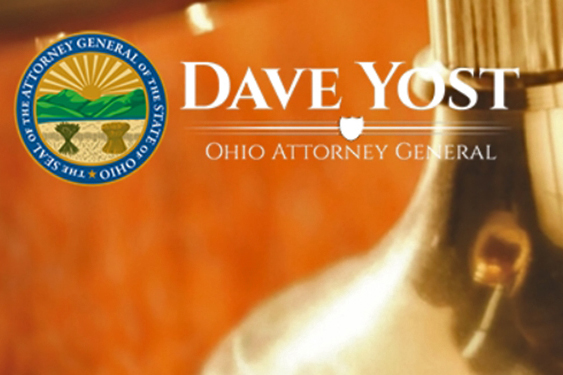
by Wayne Ohio | Dec 17, 2020 | Blog
COLUMBUS, OH, Dec. 17, 2020 — Ohio Attorney General Dave Yost today joined a bipartisan coalition of 37 other attorneys general in suing Google LLC for anticompetitive conduct in violation of Section 2 of the Sherman Act.
The states allege that Google illegally maintains its monopoly power over general search engines and related advertising markets through a series of anticompetitive exclusionary contracts and conduct. As a result, Google has deprived consumers of competition that could lead to greater choice, innovation, and better privacy protections. Furthermore, Google has exploited its market position to accumulate and leverage data to the detriment of consumers.
“Exclusion and discrimination are by their nature anti-competitive,” Yost said. “When you add those tactics to Google’s dominance, you’re stepping on the market, not competing in it.”
The states’ complaint is consistent with the lawsuit filed by the U.S. Department of Justice on October 20, which alleged that Google improperly maintains its monopoly power in general search and search advertising through the use of exclusionary agreements.
But the state’s filing asserts additional allegations and describes Google’s monopoly maintenance scheme as a multi-part effort. The lawsuit alleges that Google:
Uses exclusionary agreements and other practices to limit the ability of rival general search engines and potential rivals to reach consumers. This conduct cements Google as the go-to search engine on computers and mobile devices.
Discriminates against specialized search sites – such as those that provide travel, home repair, or entertainment services – by depriving them access to prime real estate on the search results screen because these competing sites threaten Google’s revenue and dominant position.
Disadvantages users of its search-advertising management tool, SA360, by continuously favoring advertising on its own platform and inflating its profits to the detriment of advertisers and consumers, despite its promises to the contrary that it would not favor Google search advertising over that of competing search engines such as Bing.
The attorneys general argue that more competition in the general search engine market would benefit consumers, for example, though improved privacy protections and more targeted results and opportunities for consumers. Competitive general search engines also could offer better quality advertising and lower prices to advertisers.
The attorneys general expand on the U.S. DOJ’s allegation that Google’s anticompetitive conduct continues. As explained in the complaint, the company seeks to deploy the same exclusionary contracting tactics to monopolize the emerging ways consumers access general search engines, such as through their home smart speakers, televisions, or in their cars. In so doing, Google is depriving consumers of competitive choices and blocking innovation.
The states also go further than the U.S. DOJ in explaining how Google’s acquisition and command of vast amounts of data – obtained in increasing part because of consumers’ lack of choice – has fortified Google’s monopoly and created significant barriers for potential competitors and innovators.
The attorneys general ask the court to halt Google’s illegal conduct and restore a competitive marketplace. The states also seek to unwind any advantages that Google gained as a result of its anticompetitive conduct, including divestiture of assets as appropriate. Finally, the court is asked to provide any additional relief it determines appropriate, as well as reasonable fees and costs to the states.
The complaint was filed in the U.S. District Court for the District of Columbia, in conjunction with a Motion to Consolidate seeking to combine the states’ case with the pending U.S. DOJ case.
The attorneys general joining the lawsuit include the states and territories of: Alaska, Arizona, Colorado, Connecticut, Delaware, Hawaii, Idaho, Illinois, Iowa, Kansas, Maine, Maryland, Massachusetts, Minnesota, Nebraska, Nevada, New Hampshire, New Jersey, New Mexico, New York, North Carolina, North Dakota, Oklahoma, Oregon, Pennsylvania, Rhode Island, South Dakota, Tennessee, Vermont, Utah, Virginia, Washington, West Virginia, Wyoming, the District of Columbia, and the territories of Guam and Puerto Rico.




